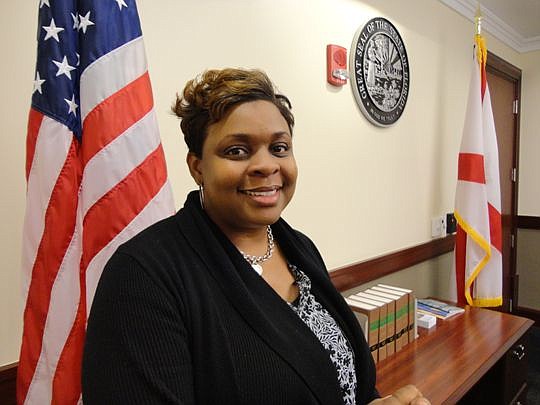
For most of her childhood, Angela Cox never thought college was a possibility, much less being a judge.
Her mother was a crack and heroin addict, one of the casualties of their poor and violent Detroit neighborhood. Cox and her older brother were raised by their grandmother.
“I had no hope, no vision, no direction for my life,” said Cox, recently appointed a circuit judge after nine years on the county bench.
When their grandmother died, Cox and her brother went to live with their aunt, Rolanda. Her aunt pushed her 15-year-old niece to understand the value of education and to take control of her life.
“She said, ‘If you don’t like the life you’re living, do something about it,’” Cox, 42, recalled last week.
That resonated with Cox, who changed her attitude and how she felt about education.
Then tragedy struck.
When Cox was a senior in high school, her older brother, Isaac, was killed by his girlfriend’s cousin. His killer was found guilty at a trial and sentenced to a long prison sentence.
It was Cox’s first exposure to the legal system. “It left a positive impression with me,” she said.
Her brother had always wanted to be a lawyer. How his case was handled pushed her toward the law, she said, particularly the prosecution side.
The first step was college.
She was inspired by her high school track coach to attend Tennessee State University, where in 1995 she earned a bachelor’s degree in criminal justice. Cox received her J.D. in 1998 from the University of Memphis School of Law.
Her first job was as a prosecutor in former State Attorney Harry Shorstein’s office. Shorstein said he recruited Cox because of her early background.
“In the criminal justice system, our goal is to intervene at the earliest age,” Shorstein said. “She fit into that perfectly.”
After more than six years as an assistant state attorney, Cox was appointed as a Duval County Court judge in 2005. At 32, she was the youngest judge appointed by Gov. Jeb Bush.
When Chief Judge Donald Moran Jr. announced in March he was retiring, Cox sought and received his support to apply for the vacancy.
The day before Thanksgiving, her phone rang. Gov. Rick Scott was calling to inform Cox he was appointing her to the circuit court.
“It was a great Thanksgiving,” she said.
As much as she enjoyed being a prosecutor, Cox has found being a judge is an even better way to contribute. Helping people resolve disputes and being able to serve the legal community are still rewarding after nine years, she said.
“I still get chills when I put on my black robe,” Cox said. “I’m living my dream.”
Cox also is making history as the first African-American female circuit judge in the Northeast Florida district.
Cox appreciates she is joining a group of history-making jurists, including Dade County Judge Leah Aleice Simms, the first African-American woman judge in Florida, appointed in 1981; Dade County Circuit Judge Melvia Green, who in 1989 became the first African-American woman circuit judge; and Justice Peggy Ann Quince, who in 1998 became the first African-American woman appointed to the Florida Supreme Court.
No matter where the rest of her career takes her, Cox knows she will always have a place in Florida legal history.
“I’ll always have my chapter,” she said. “It is quite humbling.”
Cox said she wants to continue the legacy of excellence established long ago in the 4th Judicial Circuit.
“I hope that my legacy — 35 years from now or so when I retire — I hope people say I added to the great reputation that we have,” she said.
Cox will receive her commission as a circuit judge Jan. 3 and begin hearing cases just over a week later. Her investiture is scheduled March 5.
@DRMaxDowntown
(904) 356-2466